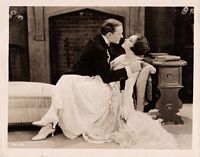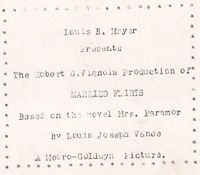

Married Flirts (1924) Metro-Goldwyn-Mayer Corp. Distributor: Metro-Goldwyn Distributing Corp. Director: Robert G. Vignola. Scenario: Julia Crawford Ivers. Titles: Frederic Hatton, Fanny Hatton. Camera: Oliver Marsh. Settings: Charles L. Cadwallader. Editor: Frank E. Hull. Costumes: Sophie Wachner. Cast: Pauline Frederick, Conrad Nagel, Mae Busch, Huntly Gordon, Paul Nicholson, Patterson Dial, Alice Holliser, plus guest appearances by John Gilbert, Hobart Henley, Robert Z. Leonard, May McAvoy, Mae Murray, Aileen Pringle, Norma Shearer. 7 reels. This film is LOST
The film survived into the early 1960s, when perished in the same MGM vault fire as London after Midnight, Divine Woman, and Tower of Lies. This film reunited her with her friend and frequent director Robert Vignola, who had worked with her in the previous decade at Famous Players. There is some disagreement as to whether it was a drama or a comedy (the New York Times called it the latter), but it seems to be have been lighter than most of her films. Its production title was "Mrs. Paramour"
 |
This behind-the-scenes photo appeared in Photoplay, Oct. 24, 1924, with the caption:
Here is the way they take the picture of a busy typewriter. To show just how it is done, Pauline Frederick posed with her director, Robert Vignola, in a scene from her latest picture, "Mrs. Paramour."
 | A still with a snipe on the back courtesy of Derek Boothroyd |  |
A Robert Vignola Production, released by Metro-Goldwyn. From the Louis Joseph Vance novel, Mrs. Paramour," adapted by Julia Crawford Ivers. At the Rialto, N.Y., week Nov. 16. Running time, 71 mins.
| "Mrs. Paramor" | Pauline Frederick |
| Perley Rex | Conrad Nagel |
| Jill Wetherell | Mae Busch |
| Pendelton Wayne | Huntley Gordon |
| Evelyn Dracup | Patterson Dial |
| Pater Granville | Paul Nicholson |
| Mrs. Callender | Alice Hollister |
A fairly interesting society drama in which there are two star roles for women. These characters are played by Pauline Frederick and Mae Busch, who just about divide the acting honors. 50-50. The two principal males role are played by Conrad Nagel and Huntley Gordon. Robert Vignola, who directed, has turned out a consistent film version of the novel that runs along in a manner which holds attention. The picture is not a world beater from the box-office standpoint, but it is a good picture of the usual program type.
It is the story of a youthful vamp who sets out to get a husband. Anybody's husband will do providing she can't snare an unattached male. She manages to vamp the husband of a novelist, and one evening at an exclusive country club the wife comes upon her husband and the young vamp in each other's arms. There is the usual scene between husband and wife and the latter goes her way alone. Atop of this scene one of the younger men who has witnessed the embrace between the girl and the older man appears on the scene and also proposes and is accepted, the girl giving the older man "air." But the damage has been done as far as his wife is concerned and she leaves him. Then, after a period of time, she attains fame as a writer, and while abroad runs into the girl who broke up her happiness and the latter's husband at a French resort. Thy are to return to America and she makes it a point to take the same steamer. She has mapped out a plan of revenge on the younger woman and she proceeds to vamp the young husband. She succeeds so well it is but a short time after they are back in the United States that the scene between the two women is repeated, except for the fact that conditions are reversed. The young woman pleads for her husband and married happiness, with the older woman relenting and calling all bets off. in the end she forgives her husband and the two start on a second honeymoon.
Pauline Frederick makes the role of the novelist a work of art. She looked stunning in the latter scenes of the picture and scored heavily. Mae Busch had to overcome a role that contained no sympathy and she did that. Her task to win her audience was twice as difficult as that of Miss Frederick, but she managed to land 100 per cent.
The picture is not an expensive one and there is nothing unusual in settings or direction that is going to make the public want to rush to see it.
December 1924
MARRIED FLIRTS--Metro
The old theme of the wife who neglects her personal appearance and loses her husband is played upon with variations. Director Robert Vignola does it smoothly and quietly. He is given first aid through a striking performance by Pauline Frederick, who depicts the woman from dowdy wife to novelist butterfly, to a nicety. The author entertains the film company producing her novel. This calls for an interesting behind-the-scene interlude.
Last revised, February 23, 2010